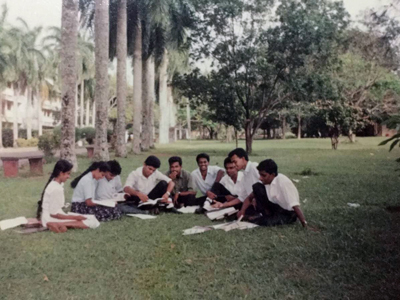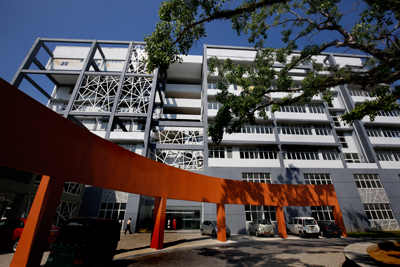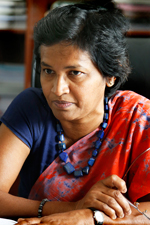Looking back with pride and looking to the future with optimism

Under the trees the medical students studied for examinations
Let alone rooms, they had no chairs to sit on. Trials and tribulations were the order of the early days, with not many teachers, no lecture halls and no hospitals for clinical training.
A common sight would be knots of fresh-faced students from the first batch of 139 of the very first Faculty of Medical Sciences (FMS) in the country sitting under trees at Gangodawila’s sprawling Sri Jayewardenepura campus, the Vidyodaya pirivena-turned-university, poring over their books.
The Vice Chancellor’s Lodge set amidst coconut groves had been turned into the teachers ‘abode’, where they sat, brainstormed and decided on the curriculum.
Twenty-five years on, many are the challenges, ordeals and hardship that the academic staff as well as the students have overcome in those early days of March 1993. Today, however, the graduates of the Sri Jayewardenepura FMS are ‘seated’ in high-level chairs across the country and the world. Talk of innovation in the medical field and often behind it would be FMS graduates.
While bright sunlight engulfs Battaramulla last Saturday, we walk into the darkened packed ballroom of the Waters’ Edge Hotel elegantly lit by flickering flames from candles on each table, to hear the pioneering teachers go back 25 years to the beginnings of a nascent institution.
MerrimentZ 2018, the Silver Jubilee celebrations that day, have been organized by the Society of Pioneer Doctors of the Sri Jayewardenepura University, the ‘firstborns’ not only to pay tribute to their gurus who battled through thick and thin to make them what they are, but also to pat themselves on the back for being trendsetters.
Then on Monday, we are at the hub of the FMS, now home to 250 students under the tender but firm guidance of its current Dean Prof. Surangi Yasawardene who too has “grown” with this fledgling institution, starting as a Probationary Lecturer in Anatomy from its birth. She is fully supported by Vice Chancellor Prof. Sampath Amaratunge.
And unlike its bigger sisters, Colombo, Peradeniya, Jaffna, Ragama and Karapitiya which are just ‘medical faculties’, the Sri Jayewardenepura FMS, the sixth, has under its spreading wings ‘medical sciences’.
Seated in her office on the 7th Floor of the Administrative Building of the FMS, Prof. Yasawardene talks of the “rapid progress” of this institution begun amidst “a lot of uncertainties”.
“Now FMS is one of the most sought-after faculties in the country,” she says.
Detailing how “we are different to the others”, Prof. Yasawardene says that they had the first Department of Medical Education; the first Department of Family Medicine; and they started the first undergraduate nursing degree programme and medical laboratory sciences degree programme in Sri Lanka.
Starting with two degree programmes in 1993, the MBBS and the B.Sc in Human Biology, now it has expanded to five degree programmes, with the addition of B.Sc Nursing (in 2005), B.Pharm (in 2006) and B.Sc Medical Laboratory Sciences (in 2007).

The modern building of the Faculty. Pix by M.A. Pushpa Kumara
There has also been a parallel development of academic departments to 17 and three paramedical units from the three departments at the beginning. Currently, the academic staff includes 27 Professors, 73 Senior Lecturers and 44 Lecturers in addition to an extended faculty consisting of Health Ministry Consultants.
Clinical teaching is at the Colombo South Teaching Hospital, Kalubowila, the Sri Jayewardenepura General Hospital and the Homagama Base Hospital, while the students also go to the National Institute of Cancer, Maharagama, the National Institute of Mental Health, Angoda and some special units of the National Hospital of Sri Lanka.
The FMS has not stuck to the ‘straight and narrow’ of tradition but widened its horizons to produce doctors who can meet the rapidly changing health needs. “Although we started our medical curriculum as a traditional curriculum, we have changed it to a hybrid curriculum encompassing a system-based integrated delivery and subject-based assessments,” says Prof. Yasawardene, reiterating that they were the first to adopt this innovative approach, with Wayamba and Sabaragamuwa looking at this model now.
It is also the first to launch a novel, state-of-the-art, purpose-built Family Practice Centre where testing and treatment are offered to thousands of men, women and children living around the faculty.
Several research centres, a must in the modern world, are being nurtured within the FMS. They include the Dengue, Cancer, Kidney and Primary Care and Allergy Research Centres where groundbreaking studies are being carried out, with the world’s eyes being riveted here and many international conferences being initiated by them. Collaborations have also been established with key international research groups and laboratories such as the University of Oxford and the University of York in the United Kingdom; the National University of Singapore; the Faculty of Medicine, University of Trondheim in Norway; the Gothenburg University and the University of Uppsala in Sweden; and the James Cook University in Australia to address national priorities and current global issues.

Prof. Surangi Yasawardene
Meanwhile, in the past five years, there has been a vibrant student-teacher exchange programme under the Linnaeus-Palme Programme between Sweden’s Kristianstad University and the FMS.
Looking to the future, Prof. Yasawardene says that the FMS hopes to launch another first next year – a degree programme in optometry.
Humble, however, were the beginnings of the FMS, when the University Grants Commission (UGC) granted permission for its establishment in July 1992, with academics of other universities having serious doubts about its viability.
With the appointment of Dr. H.H. R.Samarasinghe as Coordinator, a Curriculum Committee cobbled together with eminent persons such as the late Prof. S.R. Kottegoda, the late Prof. T.W. Wickramanayake, the late Prof. N. Kodagoda, Dr. Saroj Jayasinghe and Prof. Leela De A. Karunaratne had sat down to thrash out a medical curriculum.
Initially, the government had given an acre of land from the Methsevana Detention Centre, which still lies adjacent to it, with the FMS now having around 10 acres.
It is through the eyes of veteran Family Medicine teacher, Prof. De A. Karunaratne that we get a glimpse of those early years when on March 1, 1993, 139 students registered for the MBBS course…..“the faculty had no buildings of its own and was housed in several ‘borrowed’ locations on the campus. The administrative section was accommodated on the second floor of the library building and the spacious Vice Chancellor’s Lodge, a two-storey house, was made available for the staff rooms and offices of the academic divisions…..Arrangements were made for the temporary use of lecture halls of the Faculty of Sciences”.
The pre-medical course had begun on schedule, despite all the shortfalls, supported by the English Unit especially the Coordinator of the English Teaching Programme, Orani Jansz, with the FMS reaching ‘another milestone’ in August 1993 with Dr. E.R. Jansz and Dr. I. Jayawardane setting up the Division of Biochemistry.
From strength to strength it has grown, under the able and dynamic leadership of Coordinator Dr. Samarasinghe, followed by the Deans, the late Prof. M.T.M. Jiffry, the late Prof. Dayasiri Fernando, Prof. Narada Warnasuriya who later went onto become the Vice-Chancellor of the University of Sri Jayewardenepura, Prof. Jayantha Jayawardena, Prof. Mohan de Silva who later took up the mantle of UGC Chairman and Prof. Yasawardene.
With a strong and unshakable foundation being set by those early teachers who included Dr. Fred Perera, Dr. D.K. Ruberu, Dr. S. Sivayogan et al, the Sri Jayewardenepura Faculty of Medical Sciences is now reaching for the stars – to be the best medical faculty in Sri Lanka and to be on par with the best medical faculties in Southeast Asia.
| It’s not all medical sciences only | |
| Long before they took the Hippocratic Oath, the first batch of the Sri Jayewardenepura Faculty of Medical Sciences was once again the first to come with a Code of Conduct. Among other things they resolved to treat those who followed with kindness and concern. Not content with burying their noses in medical tomes or burning the midnight oil to pass examinations, meanwhile, they also set up the Medical Faculty Arts Circle, two years into the formation of the FMS, under the guidance of Dr. Ranil de Silva.
|
| Events and publications | |
| It is celebration time at the Sri Jayewardenepura Faculty of Medical Sciences with a three-day International Research Conference scheduled for October 7-9 and a wide-ranging Medical Exhibition from December 12-16 at the BMICH. In the pipeline, is a commemorative volume depicting the faculty’s 25-year history through photographs. January and February saw religious ceremonies being held to invoke blessings on the FMS, starting with all-night pirith chanting followed by a dana the next day. Thereafter, were held Hindu, Christian and Muslim religious activities. Meanwhile, MerrimentZ 2018 on March 3 was organized by the Society of Pioneer Doctors of the University of Sri Jayewardenepura headed by Consultant Surgeon Dr. Bawantha Gamage, a well known name in laparoscopic procedures, along with a very active team.
|


